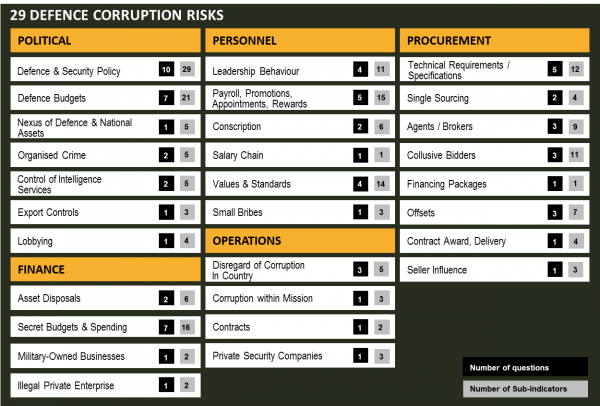By Stephanie Trapnell, Head of Research, and Michael Ofori-Mensah PhD, Project Manager
How to govern military power presents one of the great global challenges of our age. Powerful, secretive and responsible for the world’s most destructive capabilities, when the governance of defence fails, it fails spectacularly, often leading to conflict and further instability. And yet many national defence sectors lack the basic governance standards of other public sectors. Reform programmes are difficult to steward through to success, but the rewards of doing so can improve military effectiveness and help reconnect armed forces with the societies they serve.
To aid this process, Transparency International has developed the evidence-based Government Defence Integrity Index (GDI). It is the first global analysis of corruption risks and the existence and enforcement of controls to manage that vulnerability in defence and security institutions, highlighting priority areas for improvement.
The 2020 iteration of the GDI focuses on 89 countries, selected based on the following criteria:
- their significant and/or high-profile roles in the global arms trade
- being at risk for political or defence-related instability
- undergoing reforms that were expected to result in changed circumstances for defence integrity.
As such, it has a crucial role to play in driving global defence reform. The GDI is designed to be a tool for governments seeking to improve their integrity protocols and a platform to share best practice with civil society, international organisations, the media and country investors, identifying where they need to push for change in the sector.
Overall, our experience to date shows that where governments have used the GDI as a roadmap for reforms, it can make a strong contribution to bringing about positive changes and mitigate the risks corrupt practices can pose to a state’s legitimacy and ability to respond to threats.
What does the GDI measure?
The GDI measures corruption risk, not levels of corruption per se. It assesses that risk in the entire defence and security sector within a country, which involves evaluating the factors that facilitate corruption, and the dynamics that produce an environment in which corruption can flourish unchecked. It is not concerned with measuring the amount of funds that are lost, identifying corrupt actors, or estimating the perceptions of corruption by the general public.
The index is organised into five key corruption risk areas: political, financial, personnel, operational, and procurement, which are further broken down into 29 specific defence corruption risks.

Our team of experts draws together evidence from a wide variety of sources and interviewees across 212 indicators to provide a detailed assessment of the integrity of national defence institutions, and awards a score for each country from A to F. In order to provide a broad and comprehensive reflection of these risk areas, the GDI assesses both legal frameworks (de jure) and implementation (de facto), as well as resources and outcomes. Scorecards, overviews, and profiles for each country can be found here.
What is the overall goal of the GDI?
Good practice standards. The GDI provides a framework of good practice that promotes accountable, transparent, and responsible governance in the defence establishment. This standard of good practice stems from our extensive work over the last decade in working towards more accountable defence sectors and highlighting the connection between corruption and instability.
Evidence-based advocacy. The GDI is a useful tool for civil society to collaborate with Ministries of Defence, and military and oversight institutions to build their capacity in transparency and integrity. It provides rigorous evidence-based data for those focusing on the nexus of corruption and defence.
Robust programmatic approaches. Transparency International – Defence & Security has extensive experience using the index to support reform efforts. This includes: drafting integrity action plans, supporting integrity training workshops, facilitating consultation processes with civil society, and building capacities of parliamentarians to exercise oversight.
Data for countries in West and Central Africa, and the Middle East and North Africa, have recently been released. Subsequent GDI results will be released in 2020, covering Central and Eastern Europe and Latin America, G-20 countries, the Asia Pacific region, East and Southern Africa, and NATO.
Note: The GDI was previously known as the Government Defence Anti-Corruption Index (GI). The Index underwent a major update for the 2020 version, including changes to the methodology and scoring underpinning the project. This means overall country scores from this 2020 version cannot be accurately compared with country scores from previous iterations of the Index. For more information on the GDI methodology, click here.

